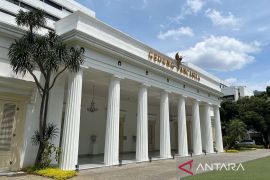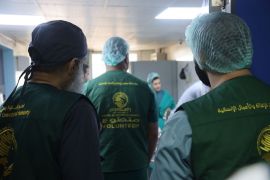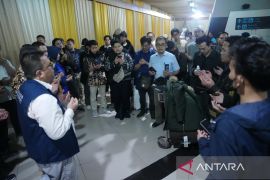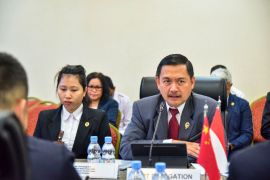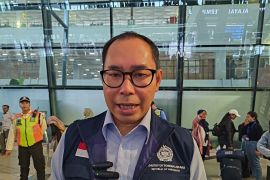Troops also launched assaults on the Damascus suburbs of Douma and Al-Maadamiyeh, witnesses said, as the head of the UN human rights agency slammed what she called the security forces` disregard for human life.
The United States, which has repeatedly denounced Syria`s repression of the protests, was considering sanctions against Damascus, an official in Washington said.
Amman said Syria on Monday closed its border with Jordan in a statement quickly denied by Syrian customs chief Mustapha Bukai.
Activist Abdullah Abazid told AFP by telephone from Daraa that Syrian forces were pounding the southern town near the border with heavy artillery and that "at least 25 martyrs have fallen."
"There are still bodies sprawled in the streets," he said, with the sound of loud explosions and gunfire in the background.
A group of activists said in a statement to media that "more than 25 people fell but no one could reach them because of the heavy shelling" and that only seven bodies were retrieved.
They were identified by name and included a father and his two sons, said the statement which accused Syrian troops of firing indiscriminately with anti-aircraft guns.
"The commander of the Third Army Corps, Kamal Ayyash, a citizen of Daraa, was arrested because he protested against the killings," the statement said.
A resident earlier said he witnessed five people killed when their car was raked with fire in Daraa, where Syria`s unprecedented anti-regime protests erupted six weeks ago.
Abazid said Daraa was "like being in a battlefield."
The army seized at least two mosques in the town as well as the cemetery where scores of people killed in anti-regime protests have been buried, activists said.
The assault began at dawn when 3,000 to 5,000 army and security forces swooped down on Daraa, with tanks taking up position in the town centre and snipers deploying on rooftops, activists said.
"The minarets of the mosques are appealing for help. The security forces are entering houses. There is a curfew and they fire on those who leave their homes. They even shot at water tanks on roofs to deprive people of water," said a witness.
A massive crackdown was also under way in Douma, a large suburb in northern Damascus, and nearby Al-Maadamiyeh, said activists reached by telephone.
"The situation is dramatic. Patrols man each alleyway and prevent people from going out even to buy bread," one resident reached by AFP said.
"Even funerals of youths killed on Friday and Saturday were not held," he added. Schools stayed closed and civil servants were unable to go to work.
An activist from Douma said security forces "surrounded a mosque and are firing indiscriminately. Streets are cut off from each other and Douma is isolated from the outside world."
There have been sweeping arrests in Douma since Sunday, he added.
Some 390 people have been killed in security crackdowns since the protests erupted, rights activists and witnesses say.
The latest bloodshed came despite President Bashar al-Assad on Thursday signing decrees ending a draconian state of emergency, imposed by the Baath party when it seized power in 1963.
He also abolished the state security court that has tried scores of regime opponents outside the normal judicial system and issued a decree "to regulate" peaceful demonstrations.
A day later, tens of thousands of people swarmed cities and towns to test the government`s sincerity, but scores were killed by security forces, activists and rights groups have said.
Rami Abdel Rahman, a prominent rights activist, told AFP that Monday`s crackdown showed Damascus had decided to crush the protests militarily.
"It is clear that the Syrian authorities have taken a decision for a military and security solution," Abdel Rahman, head of the London-based Syrian Observatory for Human Rights, told AFP.
In Washington, US National Security Council spokesman Tommy Vietor said his government could respond to the "brutal violence" with sanctions.
"The United States is pursuing a range of possible policy options, including targeted sanctions, to respond to the crackdown and make clear that this behaviour is unacceptable," said Vietor.
"The Syrian people`s call for freedom of expression, association, peaceful assembly, and the ability to freely choose their leaders must be heard."
UN High Commissioner for Human Rights Navi Pillay said the killings must stop.
"Just a few days after the announcement of sweeping and important reforms, we are seeing such disregard for human life by Syrian security forces," she said in a statement issued in Geneva.
"The first step now is to immediately halt the use of violence."
Meanwhile diplomats said that Britain, France, Germany and Portugal are seeking a UN Security Council condemnation of the killing of demonstrators in Syria and a call for an independent investigation. (*)
Editor: Kunto Wibisono
Copyright © ANTARA 2011
